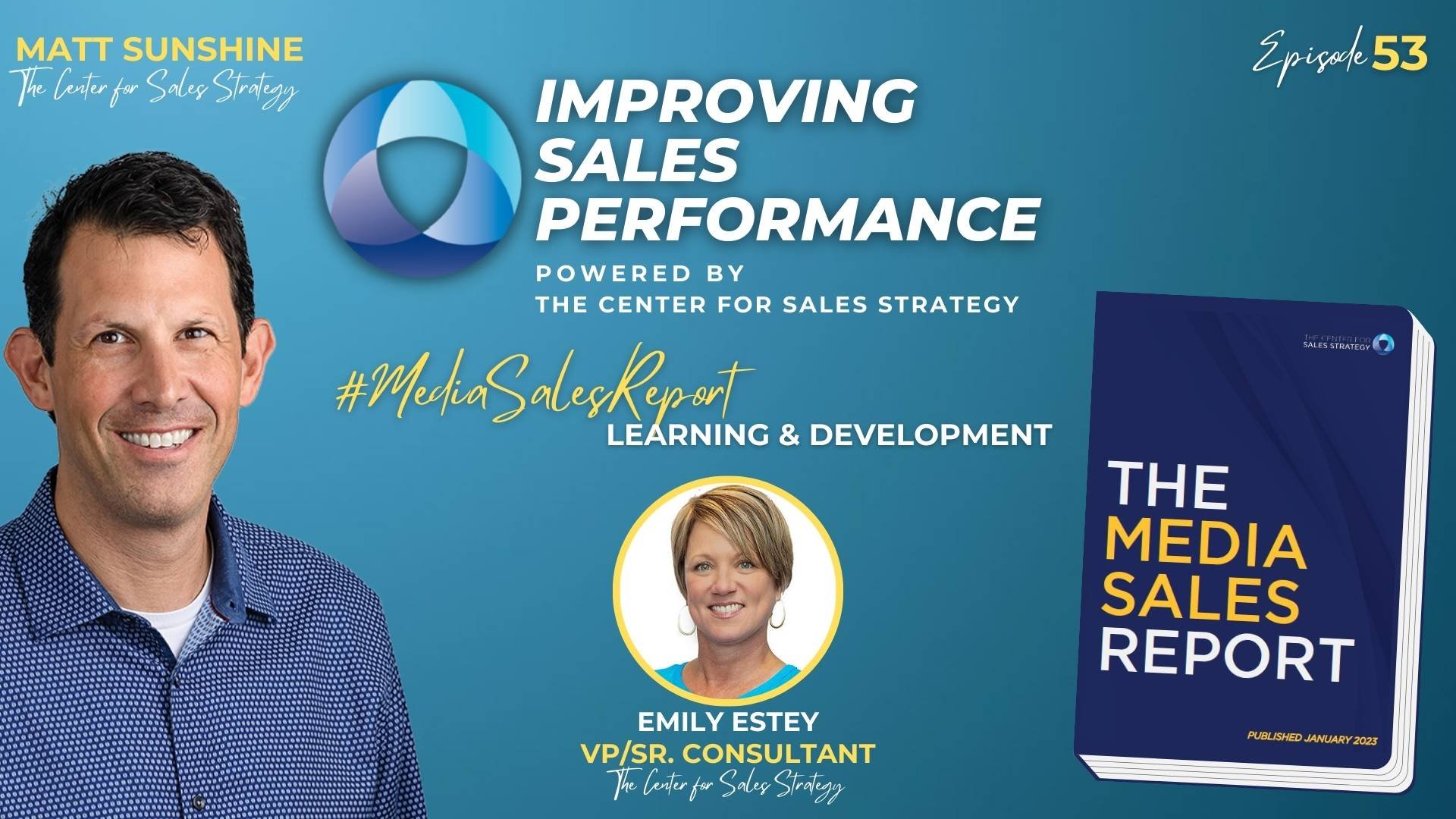
This season on Improving Sales Performance, we’re analyzing the findings from our latest Media Sales Report. With data collected from surveys conducted in Q4 of last year, the responses from sales managers and salespeople alike will help us chart a solid path forward through the media sales landscape.
In each episode, Matt will be joined by a rolling roster of outstanding experts from our team here at The Center for Sales Strategy.
Here, Matt is breaking down the Learning & Development Section of the Media Sales Report with VP/Senior Consultant, Emily Estey
Emily has such excellent takeaways on some top questions that arise from the report, like:
- What advice would you give to sales managers leading salespeople who aren't receiving trainings frequently (on a weekly or monthly basis)?
- How can sales managers have meaningful conversations with their sellers on a consistent basis?
- What would you say to managers trying to engage and inspire team members that are underperforming in their eyes?
85% of Salespeople Feel that Training is Important or Very Important
To kick off the conversation, Matt asks Emily, “Were there any stats, or is there any data that jumped out or surprised you?”
“Honestly,” Emily says. “That 85% of salespeople feel that training is important or very important.”
“That was actually a little surprising to me because what we hear, at least maybe from managers, is that there's always kind of this grumbling around training, right? And people are like, ‘uh, I don’t need training. I'm fine.’”
“So that actually was higher than I thought it was going to be. And encouraging, honestly!”
“But I think that statistic really gave me hope. I was like, ‘yes, thank God!’”
Citing another piece of data from the report, Matt says, “80% of salespeople say they are participating in training on a weekly or monthly basis. So, what advice would you give to sales leaders of the other 20% who aren’t receiving training as often?”
“I would say that, first of all, there must not be perceived value for them in training,” Emily says. “Like, they must not see that.”
“You raise and set standards with training, right? You can count on predictable results with training. You can get the team consistent in their language, which builds culture. It creates retention.”
“And it's great when you're hiring. [The Center for Sales Strategy] has been hired because people were trying to hire, and [their candidates] were like, ‘well, what's your training program?’ And companies that we were working with, like, ‘oh, we don't have one. I guess we should get one.’”
“But, I think what happens is people don't have a plan. Managers don't have a plan. And so, it's something that just gets put off and put off and put off...make a plan, make a quarterly plan, start small. Maybe pull your people and figure out where they really feel like they might be struggling.”
“If we're going to use the sports analogy, what are they doing? They're playing a game one day a week or two days a week, but they're practicing the rest of the time. You know, you’ve got to do it.”
How Often Do Sales Managers Discuss the Talents of Their Salespeople?
“Over half the salespeople, 54% tell us that their manager talks to them often about their talents,” Matt says. “That's good. However, one-third of salespeople responded that while their manager discusses their talents with them, often it merely feels like all they're doing is checking a box.”
“Do you have any thoughts on how to best avoid the ‘box checking’ feeling?”
Emily says, “First of all, way to go managers for talking to your team about their talents. And I'm sorry that you just can't win for losing, you know?”
“That's too bad. But what I would say about this, because I get that, I get that it can feel that way. I work in an organization where my talents are repeated back to me, right? I mean, that's what we do here.”
“And I understand how sometimes maybe that can feel that way, but my thought around this is to maybe get your people talking, have them talk about a success that they're having, or maybe a frustration that they're having, and then reflect back to them with the talent that you're seeing... That would be my first thought around that. Just making it a little bit more authentic.”
Matt adds, “And if you're not using a talent assessment, start using one.”
“Start using one,” Emily says. “And don't just use a talent assessment to select people. Use them for coaching, developing.”
“That's right,” Matt says. “If all you're gonna do is selection, you're missing the boat.”
Superstars and Underperformers
“Almost half of the sales managers, in fact, 45% considered about 21 to 40% of their sales team to be superstars,” Matt says. “And 18% of sales managers believe that 40% or more are underperforming. So, you have a pretty big chunk, about one-fifth of sales managers, believe that 40% of or more are underperforming.”
“First, what would you say to managers trying to keep their superstars performing consistently at that level?”
“For top performers, I can tell you that they want more and more success,” Emily says.
“And all I would say is support, support, support. Like, where are you taking backend stuff off of them? If you are making them do non-selling tasks, make sure that you're figuring out a way to take some of that stuff off their plate.
“Then whatever resources you have that you can throw at them, maybe there's some sort of executive salesperson training or maybe you can give them coaching or maybe you can do something special for them. And then I also would say, I encourage my managers to get involved in the sales process. Be an influencer for your salespeople.”
“Like get engaged in that process with them. You don't have to close the business. That's not what I'm talking about. They don't need your help there, but how can you help be an influencer?”
“You know, when we have clients, I want as many people in our organization to have a relationship with them because I think that makes them feel special. And you want your clients and prospects to feel special in that same way. So, you know, get engaged in the process, ask where you can help, even in the client-facing conversations.”
“What would you say to the managers that are trying to inspire and engage those underperforming?” Matt asks.
“If you have somebody that is highly talented and they're underperforming, which sometimes we don't, sometimes we have really not talented people who are underperforming, which makes sense. But if we have people that have talent, I would remind them that they have the talent to do the job.”
“I do that all the time when I'm coaching individuals, and they're feeling kind of down in the dumps. I'm like, ‘let me just remind you, you have all the talent you need to do this job to be successful here.’ Um, I do it all the time.”
And then, I'd be honest about their performance, I would say, ‘here's where I see some opportunities to improve. And we have to get this figured out.’”
“Have those honest conversations.”
“And then also I think people that are underperforming, especially if they have talent drives and values, talents, they know that they're underperforming and it's overwhelming to underperform for those folks.
“So, I would probably say we're going to eat this elephant one bite at a time.”
“Break it down for them. That's a different than saying, ‘oh, you're not performing, you need to perform.’ A lot of times that is overwhelming.”
“So, if you really want to invest in them, then I would break it down and help them eat the elephant one bite at a time.”
“When we're talking about talented performers or people that are underperforming, just engage with your people.”
“Look at them face to face. Look at them eye to eye. Get off your phone, get away from your computer, and have a conversation that's not distracted.”
“It's amazing in this world how often when we have a conversation with someone, we're distracted by something else. So, when we're not, it feels really, really special.”






